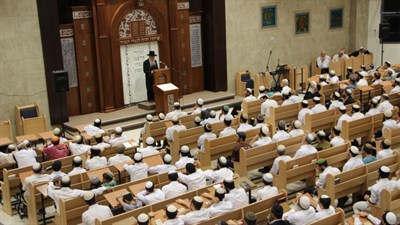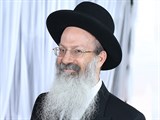series on Sections
When Av Arrives, We Curtail Our Joy - but How?
Rabbi Eliezer Melamed | Av 1 5775
How Should Natural Gas Profits be Divided? The Torah View
Rabbi Eliezer Melamed | Tamuz 15 5775
The Haredi Boycott of Heter Mechira Fruits is Unsustainable
Rabbi Eliezer Melamed | Tamuz 8 5775
The History of the Heter Mechira
Rabbi Eliezer Melamed | Tamuz 1 5775
Pesach, Matzah and Maror
The Wisdom of Rabbi Moshe Feinstein (17) - Pesach
Rabbi Baruch Finkelstein | 12 Nissan 5773
Dress Appropriately!
The Wisdom of Rabbi Moshe Feinstein (16) - Tzav
Rabbi Baruch Finkelstein | 10 Nissan 5773
Leader's Mistakes
The Wisdom of Rabbi Moshe Feinstein (15) - Vayikra
Rabbi Baruch Finkelstein | 3 Nissan 5773
A Public Building
The Wisdom of Rabbi Moshe Feinstein (14) - Vayakhel Pekudei
Rabbi Baruch Finkelstein | 24 Adar 5773
Lessons on Sections

P'ninat Mishpat: Agricultural Water Rights – part II
based on ruling 84122 of the Eretz Hemdah-Gazit Rabbinical Courts
based on ruling 84122 of the Eretz Hemdah-Gazit Rabbinical Courts
Beit Din Eretz Hemda - Gazit | Shevat 5786

Moreshet Shaul: Returning Torah to its Central Standing – part II
Based on Siach Shaul, Pirkei Machshava V’Hadracha p. 312
Based on Siach Shaul, Pirkei Machshava V’Hadracha p. 312
Various Rabbis | Shevat 5786

Ask the Rabbi: Late Payment?
Rabbi Daniel Mann | Shevat 5786

Parashat Hashavua: Rachel, Leah, and King David – What Happened? – part V
Rabbi Yossef Carmel | Shevat 5786

P'ninat Mishpat: Agricultural Water Rights – part I
based on ruling 84122 of the Eretz Hemdah-Gazit Rabbinical Courts
based on ruling 84122 of the Eretz Hemdah-Gazit Rabbinical Courts
Beit Din Eretz Hemda - Gazit | Shevat 5786

Moreshet Shaul: Returning Torah to its Central Standing – part I
Based on Siach Shaul, Pirkei Machshava V’Hadracha p. 312
Based on Siach Shaul, Pirkei Machshava V’Hadracha p. 312
Various Rabbis | Shevat 5786

Ask the Rabbi: Witness Complication at a Wedding
Rabbi Daniel Mann | Shevat 5786












